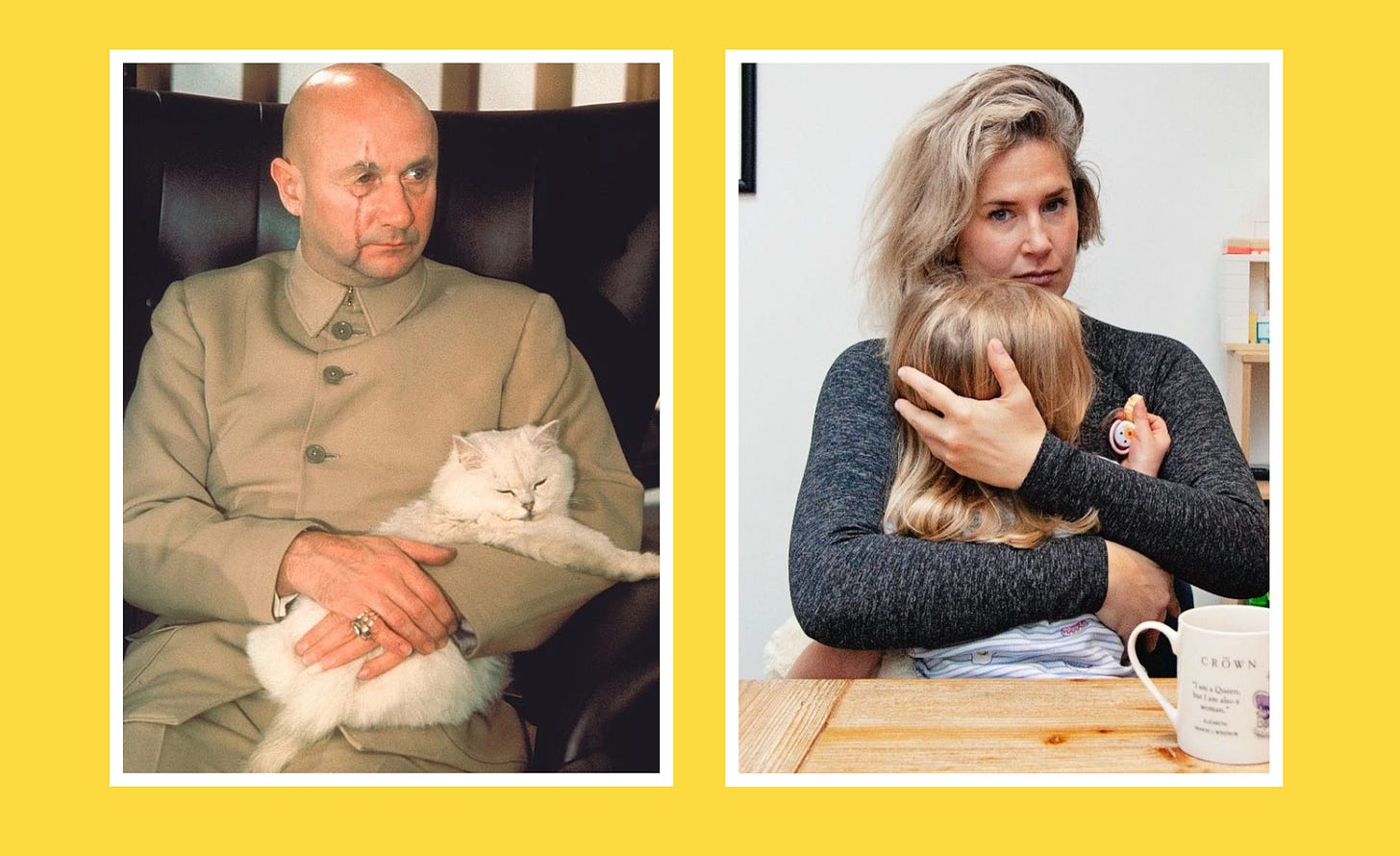Compromise is the only way to make hybrid stick
ALSO: slow job cuts are killing morale at Facebook
I occasionally get sent social media conversations about work.
Generally it’s someone who is frustrated about a decision their employer has made. Last week someone tagged me in a conversation about Lloyds Bank changing their flex policies, they added a link to an Instagram post of some sort of Bond villain stroking an animal that I admit I only briefly glanced at and decided to return to after my weekend.
After the long weekend I returned to realise it wasn’t a Bond Villain, it was in fact social media influencer ‘Mother Pukka’ who vocally champions flexible working while clutching her children close to her.
As far as I can tell Pukka does a magnificent job of making the case for employees to be given autonomy and be trusted to get their jobs done, especially as the limitations on where and when we do our work are often arbitrary and disproportionately benefit older men. As Apple employees said in an open letter to their boss, Tim Cook: ‘Stop treating us like school kids who need to be told when to be where and what homework to do.’
In this instance Pukka was enraged by Lloyds asking workers to return to the office two days a week. The Telegraph reported that employees of the bank felt that the change was set to cause serious disruption to their lives after three years of flexible working. Amongst the details that caused upset was a suggestion that ‘card swipe data’ would be used to enforce the policy.
There are growing signs that organisations are getting serious about implementing a stricter use of office time. The Lloyds change came the week after US banking giant JP Morgan ordered its senior leaders to return to the office for 5 full days a week.
Lloyds insiders said that the changes were a reflection of the desire to create a stronger sense of teamwork amongst employees. A third of employees were said to have not set foot inside company offices this year and there was a growing concern of teams becoming disconnected.
One of the additional complications was that in some parts of the business so many colleagues had chosen to work ‘compressed hours’ that there were huge shortages of support on Fridays, meaning that further requests for flexibility were being declined.
In a similar vein the Sunday Times reported that employees at BNY Mellon were told they faced ‘corrective action’ unless they came to the office for three days a week.
Of course the complexity of this topic is that all of the approaches are partly justified.
The opportunity to get work done in a more flexible way is something that has been proven to work and is a vital step to making the workplace more inclusive. Having market leading flexibility was a clear reason why Lloyds was named Top Employer of the Year earlier in the spring.
But these policy reversals are a reflection of growing concerns that leaders are privately expressing. Organisations who see workers spending limited time together are finding that work is becoming less personal and less connected. There is a fearfulness that performance is suffering as a consequence. There is also growing evidence that younger workers are suffering from the lack of developmental interactions with senior colleagues.
(More detail on that last point, in the research younger workers who got less feedback were more likely to quit their jobs - something that was especially pronounced in women. ‘We see this in promotions: sitting near coworkers decreases early promotions, but increases longer-run promotions as workers build more human capital.’)
It’s also been reported that younger workers are struggling with understanding the norms and rituals of organisations. One leader told me of how younger workers in his firm were going to HR with complaints when they were on the receiving end of critical feedback. We’ve not shown younger colleagues what we want our workplace cultures to be. The longer the version of hybrid we adopt is seen to fail, the more likely we’ll see voices asking for a full return to the workplace.
There is clearly a case for some jobs to be fully remote. The more of these jobs exist the better for making the workplace accessible. But it is no surprise that most healthy cultures are seeing the benefit of some face-to-face time. The question becomes whether that is one day a week (maybe as a meeting free day), two days or more.
But more change is set to come
It’s not hard to feel that we’re on the verge of even greater disruption to our jobs presented by AI. The likes of Microsoft 365 Copilot seem set to meaningfully change what it means to do our daily work. These changes aren’t vaguely at some point in the future, but are imminent, certainly before the end of this year. (Ethan Mollick’s latest exploration here shows that firms should be dedicating analysts to look at the potential immediately). Organisations are going to be presented with an imperative to adapt the way they work rapidly, something that often proves difficult when we’re overwhelmed in the moment.
For illustration, one of the biggest upsides of AI could be using software to summarise meetings for non-attendees. Right now the defining part of work for many of us is the burden of meetings. Small adaptations in the way we work could transform the amount of time spent on video calls or in meeting rooms. Asynchronous working could become easier than ever.
A lesson of adulthood is understanding compromise. Compromise, we know well, is when two people get what they didn’t ask for.
As the changes at JP Morgan show is that there remains the potential for organisations to enact prohibitively strict policies to try to achieve their business goals. If we’re going to make hybrid stick, accepting that compromise is a part of the process is vital.
Drawn out job cuts at Facebook (Meta) have destroyed the morale and sense of belief of employees (Good culture creates a sense that ‘we’re all in it together’, signaling a year of efficiencies to the stock market doesn’t serve to inspire the team).
Adrian Chiles talked about his reflections on my book Fortitude in his Guardian column this week
The PiXL bookclub podcast did an episode on what teachers could learn from The Joy of Work
My book Fortitude is about how resilience is found in a blend of community, identity and control - thank you to everyone who helped send it back into the Sunday Times bestsellers last week. Here’s some articles relevant to that this week
I participated in an interview with Eleanor Warner from Sifted at an event put on by the VC fund Stride:







As and ex-employee of Lloyds I’ve heard a lot about the new policy in the past week due to being close to a number of people who work there.
My overwhelming sense from what they and some other companies are trying to do is not to just take things back to how things were pre-pandemic but back decades to a time when it was possible to have standardised working patterns due to far fewer families having both parents in full time work.
The “people in charge” are flailing, they don’t know how to deal with this sudden change in working styles and patterns so they try to go backwards.
Hi, I've only recently discovered this newsletter and I like the combination of subtopics you've covered under this post. I spent close to 29 years working in an office 5 days per week, then spent the better part of three years working from home until switching to a hybrid working model where I'm in the office at least two days a week. I can appreciate all sides of the debates but a few things you mentioned seemed important to me:
I'm fortunate enough to have worked for the same corporation for my entire career. This turned out to be an incredible asset when the pandemic hit as I've developed a good network of colleagues over the years and leveraging those relationships helped make it possible to continue to be productive. I feel for people who joined companies during the pandemic and who have undoubtedly found it very hard to develop strong bonds with their colleagues without in person interaction. There's a lot of unwritten information about companies and the teams within them that is extremely difficult to grok without in person connections. So I think for many jobs some level of in person contact is critical.
But on the flipside, it's important to remember the impact of open office concepts on a person's work, especially when they were used to having offices or even cubicle walls. The socialization aspects of work are very important but so is the ability to buckle down and do some focused work with minimal interruptions. That's the beauty of hybrid working, at least for someone like me who has adult children: a place to focus with fewer distractions.
Also, if a company's been successful during the past three years of the pandemic, I think it strongly need to question any suggestion that hybrid or work from home is detrimental to performance.
I seriously hope that hybrid work remains a viable option for all workers where possible.